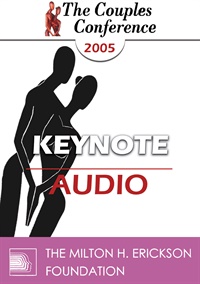
- Average Rating:
- Not yet rated
- Topic Areas:
- Keynotes | Couples Therapy | Therapist Development
- Categories:
- Couples Conference | Couples Conference 2005
- Faculty:
- Sue Johnson, EdD
- Duration:
- 1:05:34
- Format:
- Audio Only
- Original Program Date:
- Mar 06, 2005
- Short Description:
- For the first time couple therapists can truly be scientific practitioners. We know more and more about the nature of the problem - marital distress and the nature of adult love. We also can specify which interventions work and how they work. We have maps, targets, directions and a way home.
- Price:
- $15.00 - Base Price
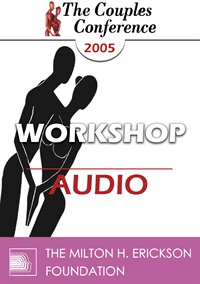
- Average Rating:
- Not yet rated
- Topic Areas:
- Workshops | Cognitive Behavior Therapy (CBT) | Couples Therapy
- Categories:
- Couples Conference | Couples Conference 2005
- Faculty:
- Frank Dattilio, PhD, ABPP
- Duration:
- 2:07:46
- Format:
- Audio Only
- Original Program Date:
- Mar 06, 2005
- Short Description:
- This workshop focuses on the specific use of cognitive-behavioral strategies as an adjunct to the many treatment modalities of couples therapy. It offers a basic overview of the theories of cognitive-behavioral therapy, particularly as it applies to couples. Participants will learn first-hand techniques and strategies for working with difficult couples and how to integrate these strategies with their respective modes of treatment. The presentation is followed by a videotape showing how to implement techniques.
- Price:
- $15.00 - Base Price
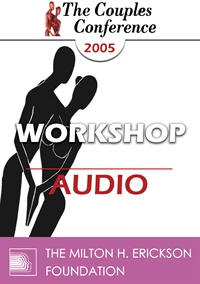
- Average Rating:
- Not yet rated
- Topic Areas:
- Workshops | Couples Therapy | Emotionally Focused Therapy (EFT)
- Categories:
- Couples Conference | Couples Conference 2005
- Faculty:
- Sue Johnson, EdD
- Duration:
- 1:52:52
- Format:
- Audio Only
- Original Program Date:
- Mar 06, 2005
- Short Description:
- This workshop will outline the EFT model of intervention while focusing on the key elements of competent practice and the challenges identified in EFT practice.
- Price:
- $15.00 - Base Price
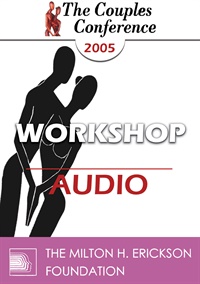
- Average Rating:
- Not yet rated
- Topic Areas:
- Workshops | Couples Therapy | Hypnosis | Sex and Sexuality | Ericksonian Hypnosis and Therapy Techniques
- Categories:
- Couples Conference | Couples Conference 2005
- Faculty:
- Jeffrey Zeig, PhD
- Duration:
- 1:47:54
- Format:
- Audio Only
- Original Program Date:
- Mar 06, 2005
- Short Description:
- Covered in this workshop will be an overview of issues in sex counseling; demographic information; issues in assessment; a phenomenological model; Ericksonian assumptions; and couples exercises for enhancing intimacy.
- Price:
- $15.00 - Base Price
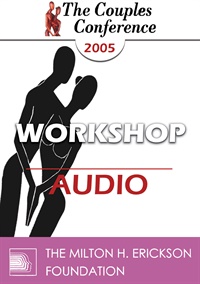
- Average Rating:
- Not yet rated
- Topic Areas:
- Workshops | Couples Therapy | Sex and Sexuality
- Categories:
- Couples Conference | Couples Conference 2005
- Faculty:
- Pat Love, EdD
- Duration:
- 2:31:15
- Format:
- Audio Only
- Original Program Date:
- Mar 06, 2005
- Short Description:
- This workshop will address the three most common sexual issues in therapy - desire discrepancy, low sexual desire and lack of sexual attraction. Physiological as well as psychological dimensions will be explored using current research and clinical applications.
- Price:
- $15.00 - Base Price
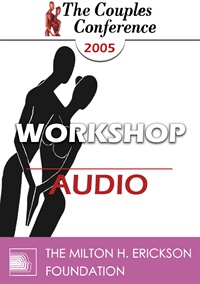
- Average Rating:
- Not yet rated
- Topic Areas:
- Workshops | Cognitive Behavior Therapy (CBT) | Couples Therapy | Family Therapy
- Categories:
- Couples Conference | Couples Conference 2005
- Faculty:
- Frank Dattilio, PhD, ABPP
- Duration:
- 2:39:29
- Format:
- Audio Only
- Original Program Date:
- Mar 06, 2005
- Short Description:
- This workshop focuses on the specific use of cognitive-behavioral strategies as an adjunct to the many treatment modalities of family therapy. It offers a basic overview of the theories of cognitive-behavioral therapy, particularly as it applies to families. Participants will learn first-hand techniques and strategies for working with difficult families and how to integrate these strategies with their respective modes of treatment. Role-playing and case reviews will be used. A question and answer period will follow.
- Price:
- $15.00 - Base Price
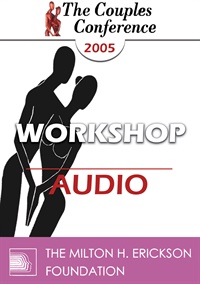
- Average Rating:
- Not yet rated
- Topic Areas:
- Workshops | Couples Therapy | Hypnosis | Sex and Sexuality | Ericksonian Hypnosis and Therapy Techniques
- Categories:
- Couples Conference | Couples Conference 2005
- Faculty:
- Jeffrey Zeig, PhD
- Duration:
- 2:38:21
- Format:
- Audio Only
- Original Program Date:
- Mar 06, 2005
- Short Description:
- Continuing from the morning program, covered in this workshop are principles for using hypnosis; advantages of hypnosis in sex counseling; experiential methods; induction approaches for hypnosis and sex therapy; and Erickson cases.
- Price:
- $15.00 - Base Price
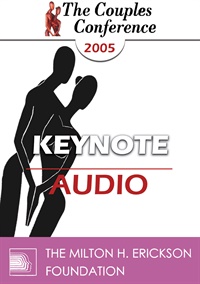
- Average Rating:
- Not yet rated
- Topic Areas:
- Keynotes | Couples Therapy | Neurobiology | Love | Addiction | Depression
- Categories:
- Couples Conference | Couples Conference 2005
- Faculty:
- Helen E. Fisher, PhD
- Duration:
- 1:02:24
- Format:
- Audio Only
- Original Program Date:
- Mar 05, 2005
- Short Description:
- Anthropologist Helen Fisher discusses the brain networks associated with romantic love to explain frustration, attraction, abandonment, rage, the despair response, love, addiction, stalking, love, suicide, and other phenomena associated with romantic rejection. She concludes that long term use of serotonin-enhancing antidepressants can jeopardize romantic love and attachment to a mate.
- Price:
- $15.00 - Base Price
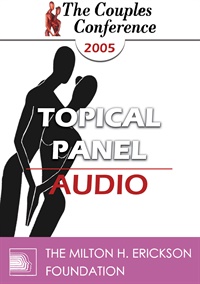
- Average Rating:
- Not yet rated
- Topic Areas:
- Topical Panels | Couples Therapy | Neurobiology | Love
- Categories:
- Couples Conference | Couples Conference 2005
- Faculty:
- Helen E. Fisher, PhD | Pat Love, EdD
- Duration:
- 55:21
- Format:
- Audio Only
- Original Program Date:
- Mar 05, 2005
- Short Description:
- CC05 Panel 01 - Anatomy and Physiology of Love - Helen Fisher, PhD and Pat Love, Ed.D.
- Price:
- $15.00 - Base Price
Tags: Couples Therapy Love
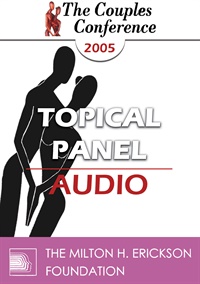
- Average Rating:
- Not yet rated
- Topic Areas:
- Topical Panels | Attachment | Couples Therapy | Differentiation
- Categories:
- Couples Conference | Couples Conference 2005 | Pioneers in Couples and Family Therapy
- Faculty:
- Ellyn Bader, PhD | Sue Johnson, EdD
- Duration:
- 1:05:52
- Format:
- Audio Only
- Original Program Date:
- Mar 05, 2005
- Short Description:
- A nuanced exploration of attachment and differentiation in couples therapy, examining how partners can maintain connection while developing individual identities. Experts Sue Johnson and Ellyn Bader discuss the delicate balance between intimacy and personal growth, emphasizing emotional experiences that help couples navigate differences and build secure, supportive relationships.
- Price:
- $15.00 - Base Price
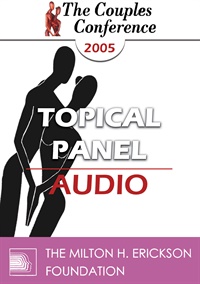
- Average Rating:
- Not yet rated
- Topic Areas:
- Topical Panels | Gender | Cultural and Social Contexts | Relationships
- Categories:
- Couples Conference | Couples Conference 2005 | Pioneers in Couples and Family Therapy
- Faculty:
- Frank Dattilio, PhD, ABPP | Peggy Papp, ACSW
- Duration:
- 1:02:16
- Format:
- Audio Only
- Original Program Date:
- Mar 05, 2005
- Short Description:
- This session looks at changing views on gender in therapy over the previous 30 years, moving from rigid stereotypes to a more nuanced understanding of men and women. Topics include the influence of cultural shifts on gender roles, the pressures of balancing work and family, and the importance of therapists recognizing their own biases. The discussion also highlights efforts to challenge sexist practices and promote mutual respect in relationships.
- Price:
- $15.00 - Base Price
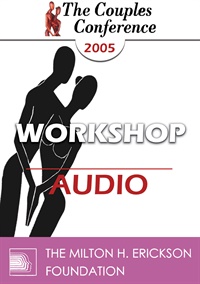
- Average Rating:
- Not yet rated
- Topic Areas:
- Workshops | Couples Therapy | Neurobiology | Love | Neuroscience
- Categories:
- Couples Conference | Couples Conference 2005
- Faculty:
- Helen E. Fisher, PhD
- Duration:
- 1:38:06
- Format:
- Audio Only
- Original Program Date:
- Mar 05, 2005
- Short Description:
- Anthropologist Helen Fisher discusses the brain networks associated with romantic love to explain frustration attraction, abandonment, rage, the despair response, love, addiction, stalking, love, suicide and other phenomena associated with romantic rejection. She concludes that long term use of serotonin-enhancing antidepressants can jeopardize romantic love and attachment to a mate.
- Price:
- $15.00 - Base Price
Tags: Couples Therapy Love Neuroscience
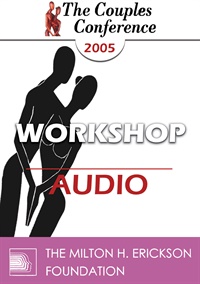
- Average Rating:
- Not yet rated
- Topic Areas:
- Workshops | Couples Therapy | Developmental Therapy Model | Confrontation | Therapist Techniques
- Categories:
- Couples Conference | Couples Conference 2005 | Pioneers in Couples and Family Therapy
- Faculty:
- Ellyn Bader, PhD
- Duration:
- 1:45:16
- Format:
- Audio Only
- Original Program Date:
- Mar 05, 2005
- Short Description:
- A comprehensive workshop exploring effective couples therapy techniques. Learn to address relationship challenges through a developmental model focusing on breaking negative cycles, setting goals, and fostering individual growth. Includes practical strategies for therapist engagement, self-assessment homework, and skill-building interventions to help couples move beyond blame and reconnect.
- Price:
- $15.00 - Base Price
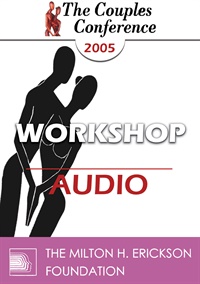
- Average Rating:
- Not yet rated
- Topic Areas:
- Workshops | Belief Systems | Relationships | Cultural and Social Contexts
- Categories:
- Couples Conference | Couples Conference 2005 | Pioneers in Couples and Family Therapy
- Faculty:
- Peggy Papp, ACSW
- Duration:
- 2:00:56
- Format:
- Audio Only
- Original Program Date:
- Mar 05, 2005
- Short Description:
- This session focuses on shifting belief systems in couples therapy, highlighting how cultural and personal histories shape relationship dynamics. A case study of a cross-cultural couple illustrates how therapy addressed communication barriers, cultural expectations, and emotional expression. Techniques included genograms, poetry, and symbolic tools like masks to improve understanding and connection. Emphasis is placed on empathy, creativity, and helping partners support each other’s growth and change.
- Price:
- $15.00 - Base Price
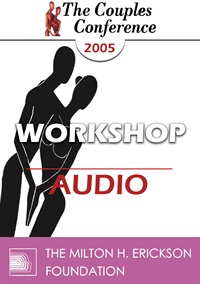
- Average Rating:
- Not yet rated
- Topic Areas:
- Workshops | Attachment | Couples Therapy
- Categories:
- Couples Conference | Couples Conference 2005
- Faculty:
- Sue Johnson, EdD
- Duration:
- 1:56:15
- Format:
- Audio Only
- Original Program Date:
- Mar 05, 2005
- Short Description:
- CC05 Workshop 10 - Attachment Theory: A Map for Couples Therapy - Susan Johnson, EdD
- Price:
- $15.00 - Base Price
Tags: Attachment Couples Therapy
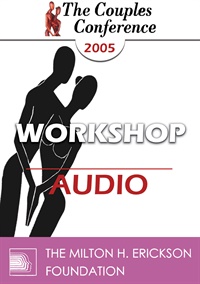
- Average Rating:
- Not yet rated
- Topic Areas:
- Workshops | Couples Therapy | Developmental Therapy Model | Confrontation
- Categories:
- Couples Conference | Couples Conference 2005 | Pioneers in Couples and Family Therapy
- Faculty:
- Ellyn Bader, PhD
- Duration:
- 1:28:23
- Format:
- Audio Only
- Original Program Date:
- Mar 05, 2005
- Short Description:
- Bader presents a transformative approach to couples therapy, emphasizing developmental growth through structured communication techniques. Learn how to guide couples beyond surface conflicts by using the Initiator-Inquirer method and Gestalt two-chair work to uncover deeper emotional patterns, reduce resistance, and enhance mutual understanding. This workshop offers practical strategies for helping couples develop greater self-awareness and build more resilient relationships.
- Price:
- $15.00 - Base Price
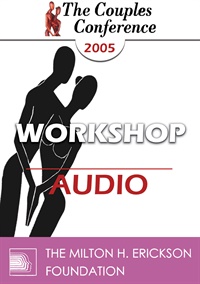
- Average Rating:
- Not yet rated
- Topic Areas:
- Workshops | Couples Therapy | Art and Creativity
- Categories:
- Couples Conference | Couples Conference 2005 | Pioneers in Couples and Family Therapy
- Faculty:
- Peggy Papp, ACSW
- Duration:
- 1:52:55
- Format:
- Audio Only
- Original Program Date:
- Mar 05, 2005
- Short Description:
- A workshop focusing on using creativity and collaboration to move past therapeutic blocks. Strategies include reflective questions, literature, and experiential exercises to shift perspective and address emotional patterns. Case examples show how books, fantasy scenarios, and symbolic storytelling help couples uncover fears, power dynamics, and relational contradictions. Tools like feedback forms and gender questionnaires support deeper understanding and personalized interventions.
- Price:
- $15.00 - Base Price
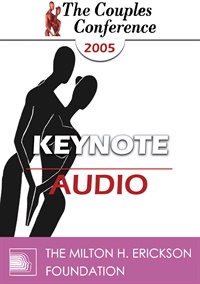
- Average Rating:
- Not yet rated
- Topic Areas:
- Keynotes | Couples Therapy | Forgiveness
- Categories:
- Couples Conference 2005 | Couples Conference
- Faculty:
- Janis Abrahms Spring, PhD, ABPP
- Duration:
- 52:53
- Format:
- Audio Only
- Original Program Date:
- Mar 04, 2005
- Short Description:
- This keynote reframes forgiveness as a mutual, relational process rather than a unilateral moral duty. Challenging common myths, it distinguishes genuine forgiveness from cheap pardon and introduces “acceptance” as a healthy alternative when offenders are unrepentant or unavailable. Participants learn what repair actually requires from both parties, how apology and accountability restore dignity, and why thoughtful engagement, not quick absolution, leads to real healing and restored connection.
- Price:
- $15.00 - Base Price
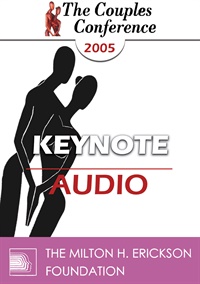
- Average Rating:
- Not yet rated
- Topic Areas:
- Keynotes | Couples Therapy | Relational Life Therapy Model (RLT) | Relationships
- Categories:
- Couples Conference | Couples Conference 2005 | Pioneers in Couples and Family Therapy
- Faculty:
- Terry Real, LICSW
- Duration:
- 53:44
- Format:
- Audio Only
- Original Program Date:
- Mar 04, 2005
- Short Description:
- Introduces Relational Empowerment Therapy, a model for modern relationships that addresses emotional imbalance between partners. Focuses on helping less dominant partners challenge unhealthy dynamics through direct confrontation, naming behaviors, and building empathy. Highlights the roles of grandiosity and shame, offering practical tools like precise feedback and functional skill-building. Encourages therapists to speak truth with compassion and humility.
- Price:
- $15.00 - Base Price
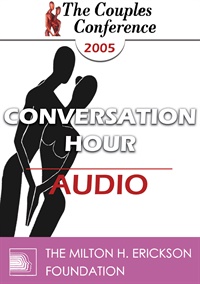
- Average Rating:
- Not yet rated
- Topic Areas:
- Conversation Hours | Couples Therapy | Conflict | Therapist Techniques
- Categories:
- Couples Conference | Couples Conference 2005 | Pioneers in Couples and Family Therapy
- Faculty:
- Ellyn Bader, PhD
- Duration:
- 41:23
- Format:
- Audio Only
- Original Program Date:
- Mar 04, 2005
- Short Description:
- A comprehensive exploration of working with difficult couples through a developmental model, focusing on differentiation, communication techniques, and strategic therapeutic interventions. Learn how to help couples identify destructive patterns, address hidden vulnerabilities, and develop more effective relationship skills through structured, goal-oriented therapy.
- Price:
- $15.00 - Base Price
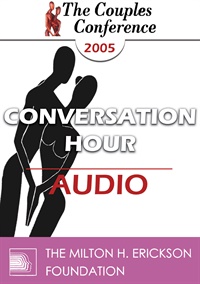
- Average Rating:
- Not yet rated
- Topic Areas:
- Conversation Hours | Relationships | Neurodiversity
- Categories:
- Couples Conference | Couples Conference 2005 | Pioneers in Couples and Family Therapy
- Faculty:
- Terry Real, LICSW
- Duration:
- 1:04:48
- Format:
- Audio Only
- Original Program Date:
- Mar 04, 2005
- Short Description:
- This talk addresses the evolving dynamics of modern relationships, with a focus on shifting men from patriarchal roles to relational accountability. It emphasizes relationship empowerment through truth, love, and mutual responsibility. The discussion also considers the complexities of women's roles and integrates insights from psychodynamic, family systems, trauma, and gender-focused therapies.
- Price:
- $15.00 - Base Price
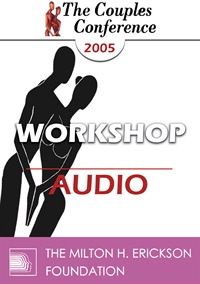
- Average Rating:
- Not yet rated
- Topic Areas:
- Workshops | Affairs | Couples Therapy | Trauma
- Categories:
- Couples Conference | Couples Conference 2005
- Faculty:
- Janis Abrahms Spring, PhD, ABPP
- Duration:
- 1:55:56
- Format:
- Audio Only
- Original Program Date:
- Mar 04, 2005
- Short Description:
- This workshop offers a framework for guiding couples through the trauma and confusion that follow an affair. Blending clinical insight with personal narrative, it explains the hurt partner’s destabilizing losses, the unfaithful partner’s ambivalence and idealization, and the powerful forces that drive both obsession and romantic love. Participants learn a three stage model for naming trauma, making thoughtful decisions about the future, and rebuilding trust through accountability, truth telling, and meaningful behavioral change.
- Price:
- $15.00 - Base Price
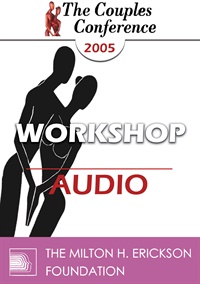
- Average Rating:
- Not yet rated
- Topic Areas:
- Workshops | Relational Recovery Therapy (RRT) | Relationships
- Categories:
- Couples Conference | Couples Conference 2005 | Pioneers in Couples and Family Therapy
- Faculty:
- Terry Real, LICSW
- Duration:
- 1:52:59
- Format:
- Audio Only
- Original Program Date:
- Mar 04, 2005
- Short Description:
- Presents the core principles of Relational Empowerment Therapy, addressing cultural shifts from traditional to intimate partnerships. Focuses on correcting emotional imbalance between men and women by confronting grandiosity and empowering the less dominant partner. Highlights the use of leverage, healthy shame, directive techniques, and family-of-origin work to foster authentic connection. Emphasizes the role of therapists in teaching skills and guiding clients toward mutual respect and intimacy.
- Price:
- $15.00 - Base Price
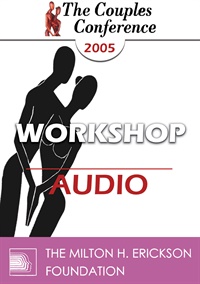
- Average Rating:
- Not yet rated
- Topic Areas:
- Workshops | Couples Therapy | Hypnosis | Hypnotherapy | Experiential Therapy
- Categories:
- Couples Conference | Couples Conference 2005
- Faculty:
- Jeffrey Zeig, PhD
- Duration:
- 2:08:39
- Format:
- Audio Only
- Original Program Date:
- Mar 04, 2005
- Short Description:
- Hypnosis is an experiential method of "gift wrapping" ideas. With or without formal trance, hypnotic methods can be used in the assessment and intervention process of couples therapy.
- Price:
- $15.00 - Base Price
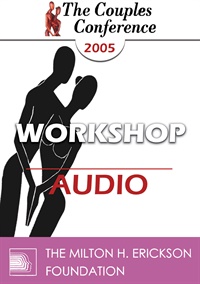
- Average Rating:
- Not yet rated
- Topic Areas:
- Workshops | Couples Therapy | Intimacy | Forgiveness | Healing
- Categories:
- Couples Conference | Couples Conference 2005
- Faculty:
- Janis Abrahms Spring, PhD, ABPP
- Duration:
- 1:59:31
- Format:
- Audio Only
- Original Program Date:
- Mar 04, 2005
- Short Description:
- This workshop presents an in depth, practical model of “acceptance,” a healing alternative when an offender cannot or will not make amends. Participants learn how hurt parties can honor their emotions, reduce obsessive rumination, protect themselves from further harm, and see the offender’s behavior in a broader context without excusing it. Through vivid clinical examples, the session offers a step by step roadmap for resolving injury, reclaiming dignity and moving forward even when genuine forgiveness is not possible.
- Price:
- $15.00 - Base Price

